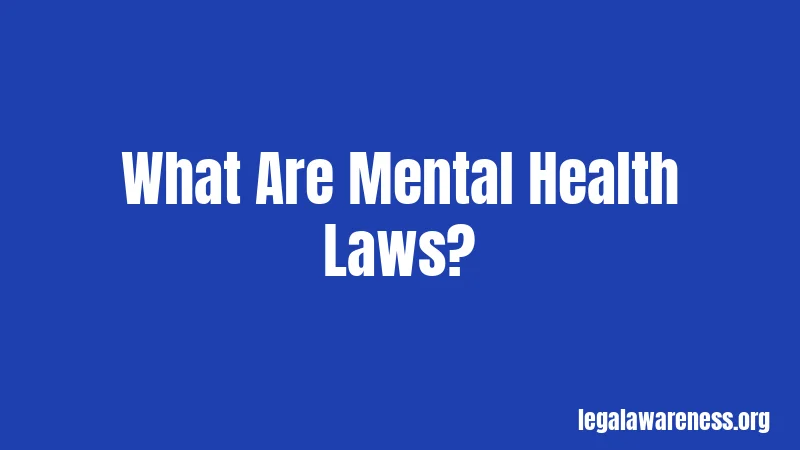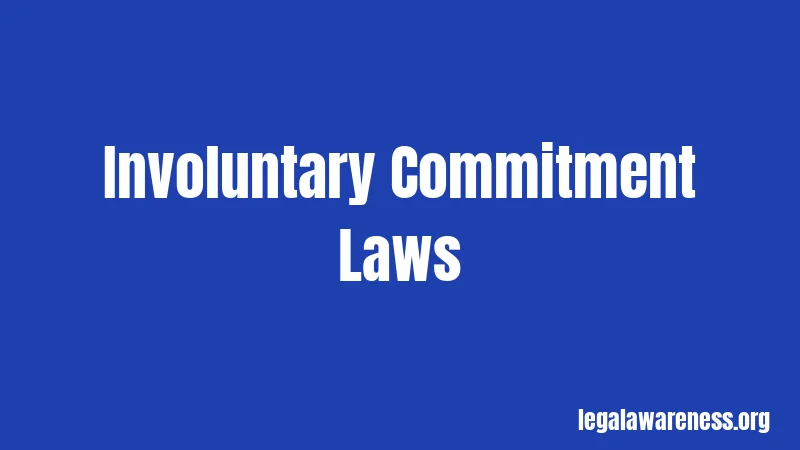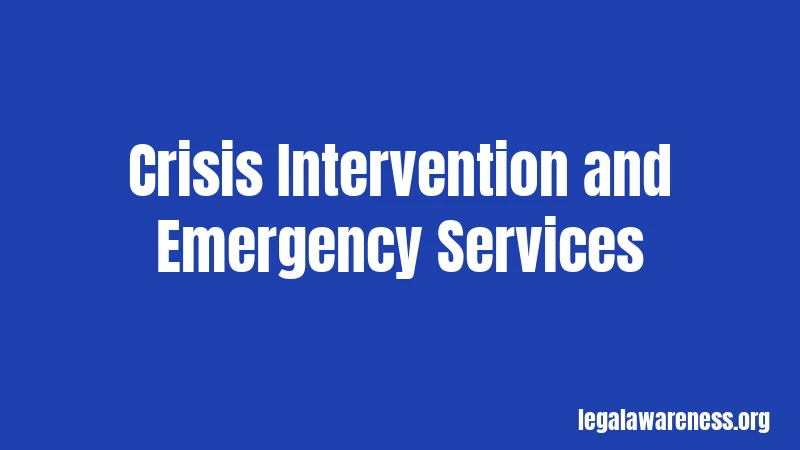Mental Health Laws in Illinois (2026): Your Rights and Protections
Most people have no idea how many mental health protections exist in Illinois. Seriously. These laws are designed to keep you safe and ensure you get proper care when you need it. But a lot of people get them wrong or don’t know they exist at all.
Here’s the thing: understanding Illinois mental health laws matters. Whether you’re dealing with your own mental health crisis or helping someone else, knowing your rights can be the difference between getting proper help and facing unnecessary problems.
What Are Mental Health Laws?

Mental health laws are basically the rules that protect people with mental health conditions. Think of them like safeguards. They cover everything from how hospitals handle emergency situations to how employers have to treat you if you have depression or anxiety.
These laws exist because people with mental health conditions have historically faced discrimination. Honestly, these protections are pretty important stuff.
Your Rights Under Illinois Law
The right to mental health care. You have the right to access mental health treatment in Illinois. Pretty straightforward. Nobody can prevent you from getting help.
Protection from discrimination. Illinois law says employers can’t discriminate against you based on your mental health. You also get protection in housing, education, and public services. This means if you have a mental illness, you still deserve the same opportunities as everyone else.
Privacy and confidentiality. Your mental health information is private. Doctors, therapists, and hospitals have to keep your medical records confidential. There are very few exceptions to this rule.
The right to informed consent. Before any treatment happens, you need to understand what’s being done and why. Doctors have to explain your options. You get to make your own choices about your care.
The right to refuse treatment. In most situations, you can refuse treatment. That said, there are exceptions. If you’re an immediate danger to yourself or others, Illinois allows emergency interventions.
Involuntary Commitment Laws

Okay, pause. This part is important. Involuntary commitment is when someone can be held in a mental health facility against their will. It sounds serious because it is.
When can someone be involuntarily committed? Illinois law allows involuntary commitment only in specific situations. You can be held if you’re mentally ill AND pose a real danger. That means you’re actually likely to harm yourself or others. Not just that you might someday. Right now.
The process. It doesn’t happen overnight. A doctor or other authorized person files a petition. You get a hearing within three days. At that hearing, you can have a lawyer and present your case. A judge decides whether commitment is necessary.
How long can you be held? Illinois law limits this. An initial order can hold you for a maximum of ten days. After that, there’s another hearing. If they want to keep you longer, they need a different type of order. This continues until you’re no longer considered dangerous.
Your rights during commitment. Even when you’re involuntarily committed, you still have rights. You get to communicate with people outside the facility. You can have visitors. You can request a hearing to challenge your commitment.
Wondering if someone you know could be involuntarily committed? The key is immediate danger. If they’re just struggling or having a bad time, that’s not enough.
The Mental Health and Addiction Parity Law
Illinois follows both state and federal parity laws. Basically, that means your mental health coverage has to be treated the same as physical health coverage.
Here’s what this means for you. If you have insurance and it covers surgery, it should cover therapy the same way. Same copays, same deductibles, same number of covered visits. Insurance companies can’t make mental health treatment harder to access than physical health treatment.
This applies whether you’re getting individual therapy, going to a psychiatrist, or checking into a treatment facility. The insurance rules have to be equal.
Crisis Intervention and Emergency Services

Illinois takes mental health crises seriously. If you’re having a mental health emergency, you need to know what happens next.
Calling 911. You can call 911 if you or someone else is in a mental health crisis. Police respond, but increasingly, crisis intervention teams do too. These are specially trained officers who know how to handle mental health situations without escalating things. It’s better than a regular police response in many cases.
Mobile crisis units. Many Illinois counties have mobile crisis units. These are teams of mental health professionals who come to your location. They can help de-escalate situations and connect you to services right then and there. Way better than going to the emergency room sometimes.
Crisis hotlines. Illinois has the 988 Suicide and Crisis Lifeline. Just call or text 988. Real people answer. They’re trained to help. It’s confidential and free.
Emergency psychiatric holds. If you go to a hospital for a mental health emergency, doctors can hold you temporarily. This is different from involuntary commitment. It’s usually just a few hours while they figure out what you need next.
Let me be honest. Getting help in a crisis can feel overwhelming. The good news is that Illinois has systems designed specifically for these situations.
The Commitment to Adequate Mental Health Care Act
Illinois passed this law to make sure the state actually funds mental health services properly. Sounds obvious, but it’s surprisingly important. Many states under-fund mental health compared to other services.
This law requires Illinois to do several things. First, make sure mental health services are actually available. Second, ensure people can access these services without crazy wait times. Third, fund psychiatric hospitals and community mental health centers adequately.
What does this mean for you? It means the state is supposed to make sure mental health help is available when you need it. If there are huge gaps in services, it violates this law.
Workers’ Compensation and Mental Health
Here’s something most people don’t know about: mental health can be covered under workers’ compensation in Illinois. That means if you develop a mental illness because of work conditions, you might get compensation.
Work-related mental health injuries. If your job causes severe stress or trauma that results in a mental health condition, Illinois may cover it. This includes depression, anxiety, and PTSD from workplace incidents.
The challenge. The tricky part is proving the condition came from work. You’ll need solid documentation and medical evidence. Most cases require a hearing.
Getting benefits. If approved, you get medical treatment covered. You might also get lost wage replacement if you can’t work.
Not sure if your situation qualifies? Talk to a workers’ comp attorney. They know this stuff inside and out.
Protecting Privacy: HIPAA and Illinois Law
Your mental health information is seriously protected. HIPAA is a federal law, but Illinois adds extra protections on top of it.
Who can see your records. Basically, only people who need to see them for treatment can. Your therapist, your psychiatrist, maybe your primary care doctor. That’s usually it.
What about family? Here’s something that surprises people. Your family doesn’t automatically get access to your mental health records. Even adult children can’t see a parent’s records without permission. It’s that strict.
Exceptions. There are a few situations where your information can be shared without your permission. If you’re a danger to yourself or others, providers can warn people. If you’re a minor, parents usually get access. If you’re involved in a court case, records might come out.
Requesting your records. You have the right to see your own mental health records. Ask your provider. They have to give them to you within a reasonable time.
Mental Illness as a Defense in Criminal Cases
This is a complex area, but it matters. In Illinois, you can use a mental health condition as a legal defense in criminal cases.
The insanity defense. Illinois recognizes something called the insanity defense. Basically, if you couldn’t understand your actions or control them because of mental illness, you might not be guilty. The exact standard is specific, though. Courts don’t just accept that someone had depression or anxiety.
Mental health courts. Some Illinois counties have mental health courts. These are special courts designed for people charged with crimes who have mental illness. They focus on treatment instead of punishment. You still might face consequences, but the goal is getting you help.
Fitness to stand trial. If you’re too mentally ill to understand the court process or work with your lawyer, you can’t be tried right now. You get treatment until you’re able to participate in your defense.
This gets complicated fast. If you’re facing criminal charges and have a mental health condition, get a lawyer immediately.
Mental Health Insurance Discrimination
Insurance companies can’t treat mental health worse than physical health. But they try sometimes. Knowing your rights helps.
Denying coverage. Insurance companies can’t deny coverage just because you have a mental health condition. They also can’t deny you for pre-existing mental health conditions.
Limiting visits. Some insurers try to limit how many therapy sessions you can have. This violates parity law if it’s stricter than physical health limits.
Medication coverage. Your insurance has to cover psychiatric medications at the same level as other medications. They can’t require special approvals just because it’s psychiatric medication.
What to do if you’re denied. File an appeal. Get your doctor to write a letter explaining why the treatment is necessary. Document everything. If the insurance company still refuses, you can file a complaint with Illinois Department of Insurance.
Discrimination in Housing and Employment
Illinois has strong laws protecting people with mental health conditions.
Housing. A landlord can’t refuse to rent to you because you have a mental illness. They can’t treat you worse than other tenants. Service animals for mental health conditions are protected. If you have an emotional support animal prescribed by a therapist, housing has to allow it even in no-pet buildings.
Employment. Your employer can’t discriminate against you based on mental health. They have to provide reasonable accommodations. That might mean flexible hours for therapy appointments. It might mean working from home on bad days. The accommodations have to be reasonable, but employers have to try.
Education. Schools can’t discriminate based on mental health either. If you’re a student with a mental health condition, you can get accommodations. This includes extensions on assignments, separate test environments, or reduced course loads.
What counts as discrimination. Treating someone worse because of their mental health condition is illegal. Spreading rumors about someone’s mental illness can be. Refusing service because someone has a mental health condition definitely is.
Crisis Text Line and Crisis Services
Not ready to call 988? Illinois has texting options too.
Crisis Text Line. Text HOME to 741741. You’ll connect with trained counselors. It’s anonymous. It’s confidential. It’s available 24/7.
Other hotlines. Illinois has condition-specific hotlines. Depression, anxiety, substance abuse, eating disorders. Most are available around the clock.
When to use these. Use them when you’re struggling but not in immediate danger. If you’re about to hurt yourself, call 911 instead.
Sound complicated? It’s not. Pick whatever feels most comfortable. Text, call, chat online. What matters is getting help.
Confidentiality and Your Rights
Here’s something important. Therapists and psychiatrists can’t just tell people about your treatment.
Mandatory reporting exceptions. There are situations where confidentiality ends. If you tell a therapist you’re going to hurt someone, they can warn that person. If you’re abusing a child, they have to report it to authorities. If you tell them you’re abusing an elder, same thing.
Substance use records. Special federal law protects substance use treatment records even more strictly than regular mental health records. Insurance companies can’t even know you’re in substance use treatment without permission.
Court orders. If a court orders your records, providers have to give them. But even then, you get a chance to object. The court has to decide the records are really necessary.
Your therapist and family. Your therapist can’t talk to your parents, spouse, or friends without your permission. Even if they ask directly.
Mental Health Parity for Children
Minors in Illinois get strong protection under mental health parity laws.
School-based services. Schools have to provide mental health services without discrimination. If a student needs therapy or psychiatric care, it’s supposed to be available.
Parental involvement. Parents usually need to consent to treatment for minors. But there are exceptions. Minors can sometimes access treatment confidentially. Rules vary depending on age and type of treatment.
Insurance for minors. If a minor is on a parent’s insurance, mental health coverage has to match physical health coverage. Same copays, same visit limits.
Transition to adulthood. When a young adult turns 18, their privacy changes. Parents lose automatic access to records. It’s something to plan for.
What Happens If Your Rights Are Violated
If you think your mental health rights were violated, you have options.
File a complaint. You can complain to the Illinois Department of Insurance if an insurance company violates parity law. You can complain to the Illinois Department of Financial Services if a hospital violates your rights. You can contact the state health department for other issues.
Hire a lawyer. Many lawyers handle mental health discrimination cases. Some work on contingency, meaning you pay nothing unless you win.
Civil rights complaints. The Illinois Department of Human Rights handles discrimination complaints. You can file a complaint if you faced discrimination in housing, employment, or education based on mental health.
Small claims court. For minor disputes, you might file in small claims. This is cheaper and faster than regular court.
Frequently Asked Questions
Can my employer fire me for having a mental health condition? Not legally. If they fire you because of mental illness, that’s discrimination. You could have a case. Document everything and talk to a lawyer.
Does my therapist have to tell my family what we discuss? No. Your therapist needs your permission to share anything with family. The only exceptions are safety situations.
What’s the difference between a voluntary and involuntary hospital stay? Voluntary means you choose to go. You can leave anytime. Involuntary means you’re held even if you don’t want to stay. It requires a court order or immediate danger.
Can insurance companies refuse to cover certain mental health treatments? Not if it’s medically necessary. They can require prior authorization, but they can’t just deny it. If denied, appeal.
What if I’m having thoughts of suicide? Call 988 immediately. Or text HOME to 741741. Go to an emergency room. Tell someone you trust. These are not emergencies to face alone.
Does Illinois have mental health court? Yes. Not all counties have it, but many do. Ask your public defender if mental health court is available for your case.
Can my employer ask about my mental health? Generally no. Medical questions are restricted. They can ask if you’re able to do essential job functions. They shouldn’t ask about diagnoses or medications.
Are service animals for mental health protected in Illinois? Yes. Emotional support animals for psychiatric conditions get housing protections. Ask your therapist or psychiatrist about documentation.
Getting Help and Resources
988 Suicide and Crisis Lifeline. Call or text 988. Available 24/7. Free and confidential.
Crisis Text Line. Text HOME to 741741. Same support, texting option.
Illinois Department of Public Health. Coordinates mental health services across the state. Their website lists providers and facilities.
Illinois Disability Rights. A nonprofit that advocates for people with mental health conditions. They help with legal issues.
Mental Health America of Illinois. Provides education and support. Connects people to services.
Legal Aid Chicago. Free legal help if you can’t afford a lawyer.
Your primary care doctor. They can refer you to mental health providers. Insurance usually covers these referrals.
Final Thoughts
Illinois has strong mental health laws. Your rights are protected. But a lot of people don’t know this stuff, so take your time understanding what applies to you.
Remember: having a mental health condition is not shameful. It doesn’t make you weak. You deserve proper care and protection under the law. Use these resources. Know your rights. Reach out when you need help.
If you’re in crisis right now, please reach out. Call 988. Text 741741. Tell someone. You don’t have to handle this alone.
Stay informed. Stay safe. And never hesitate to reach out for help.
References
Mental Health America: Mental Health Parity Law
Illinois Department of Public Health: Mental Health Services
Illinois Disability Rights: Mental Health Advocacy
988 Suicide and Crisis Lifeline: Illinois Resources
Crisis Text Line: Support Services
Illinois Department of Insurance: Health Insurance Complaints
